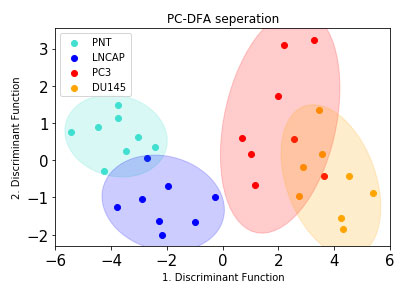Research focus
Dissolution Dynamic Nuclear Polarization (dDNP) is a power full tool for enhancing sensitivity of Nuclear Magnetic Resonance (NMR) measurements. By hyperpolarizing the nuclear spins, the signal-to-noise ratio can be enhanced over 40,000 times, allowing us to potentially use metabolomic data to differentiate between prostate cancer cell lines with different levels of aggressiveness.
This project focuses on how the strongest dDNP signal can be obtained, and the statistical analysis with machine learning on the data. The overall objective is to demonstrate how dDNP NMR obtained data from prostate cancer cells and tissue can be analysed to show the underlying metabolic patterns of the disease.
Perspective
At present, many patients with prostate cancer are subjected to invasive treatments for slow developing cancers that could lie dormant for the rest of the patient’s life without harming him. More precise diagnostic tools could save people from complications from surgery, if we only treated people whose cancer was likely to spread and cause damage. It is known that cell metabolism changes as it grows cancerous and develops other ways to produce energy compared to a healthy cell. If dDNP NMR data can be used to classify aggressive and non-aggressive prostate cancer samples correctly, knowledge about detectable metabolic profiles can be obtained and this could help to better diagnostics and treatment planning.

Figure 1: Separation of aggressive (PC3 and Du145) and less aggressive (PNT and LNCAP) prostate cancer cell lines. Made with PC-DFA analysis on dDNP NMR metabolic fingerprints.
Scientific output
Find Anne's publications at DTU's online research database ORBIT.
Funding
The project is funded by Danish National Research Foundation as part of the HYPERMAG Center of Excellence (DNRF124).
Supervisors
Senior Researcher Mathilde H. Lerche and Associate Professor Pernille Rose Jensen.
Project period
January 2018 - December 2020